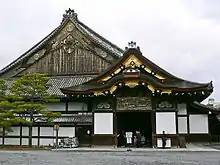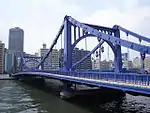List of Cultural Properties of Japan - structures (Tokushima)
This list is of the Cultural Properties of Japan designated in the category of structures (建造物, kenzōbutsu) for the Prefecture of Tokushima.[1]
National Cultural Properties
As of 1 January 2015, seventeen Important Cultural Properties with thirty-seven component structures have been designated, being of national significance.[2][3][4]
| Property | Date | Municipality | Comments | Image | Coordinates | Ref. |
|---|---|---|---|---|---|---|
| Aihara Family Residence 粟飯原家住宅 Aihara-ke jūtaku | 1710 | Kamiyama | 33°57′55″N 134°19′34″E | |||
| Ichinomiya Jinja Honden 一宮神社本殿 Ichinomiya Jinja honden | 1630 | Tokushima | 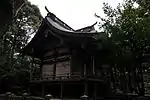 | 34°02′16″N 134°27′45″E | ||
| Ushihiko Jinja Honden 宇志比古神社本殿 Ushihiko Jinja honden | 1599 | Naruto | 34°09′44″N 134°32′13″E | |||
| Former Nagaoka Family Residence 旧長岡家住宅 kyū-Nagaoka-ke jūtaku | 1735 | Mima | 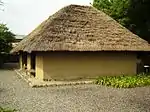 | 34°04′12″N 134°09′20″E | ||
| Mikawa Family Residence 三河家住宅 Mikawa-ke jūtaku | 1928 | Tokushima | 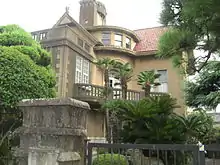 | 34°03′59″N 134°33′22″E | ||
| Miki Family Residence 三木家住宅 Miki-ke jūtaku | 1615-60 | Mima | 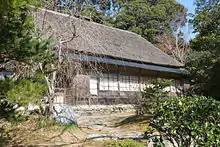 | 33°57′51″N 134°12′21″E | ||
| Kōne Family Residence 小采家住宅 Kōne-ke jūtaku | 1804-43 | Miyoshi | 33°52′08″N 133°58′47″E | |||
| Jōroku-ji Kannondō 丈六寺観音堂 Jōrokuji Kannondō | 1648 | Tokushima | 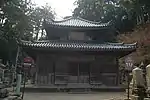 | 34°00′17″N 134°33′03″E | ||
| Jōroku-ji Kyōzō 丈六寺経蔵(旧僧堂) Jōrokuji kyōzō (kyū-sōdō) | 1644 | Tokushima | 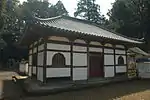 | 34°00′18″N 134°33′04″E | ||
| Jōroku-ji Sanmon 丈六寺三門 Jōrokuji sanmon | late Muromachi period | Tokushima | 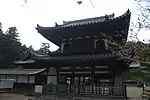 | 34°00′19″N 134°33′05″E | ||
| Jōroku-ji Hondō 丈六寺本堂(元方丈) Jōrokuji (moto hōjō) | 1629 | Tokushima | 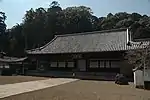 | 34°00′19″N 134°33′03″E | ||
| Kirihata-ji Daitō 切幡寺大塔 Kirihata daitō | 1618 | Awa |  | 34°06′29″N 134°18′13″E | ||
| Tanaka Family Residence 田中家住宅 Tanaka-ke jūtaku | 1685 | Kamikatsu | 33°52′30″N 134°21′05″E | |||
| Tanaka Family Residence 田中家住宅 Tanaka-ke jūtaku | Bakumatsu to early Meiji period | Ishii | designation comprises eleven components: main building (1865), zashiki (1885), treasury (1859), front gate and storehouse (1870), indigo storehouse (1887), south (1860) and north (1873) indigo processing areas, and miso room, lodge, and ash store (early Meiji period) | 34°05′25″N 134°26′47″E | ||
| Hashikura-ji 箸蔵寺 Hashikuraji | end of Edo period | Miyoshi | designation comprises six components: honden (1830–67), hōjō (1856), and gomaden, Yakushidō, shōrōdō, and Tenjinja honden (1861) | 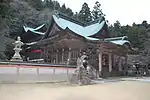 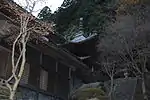 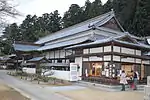 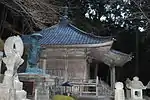 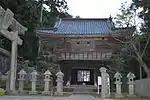 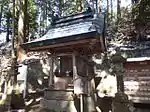 | 34°02′57″N 133°50′30″E | |
| Fukunaga Family Residence 福永家住宅 Fukunaga-ke jūtaku | 1818-1909 | Naruto | designation comprises six components: main building (1828), detached zashiki (1832), storehouse (1833), barn and firewood storehouse (1818–43), and salt storehouse (1909) | 34°12′20″N 134°35′21″E | ||
| Kimura Family Residence 木村家住宅 Kimura-ke jūtaku | 1699 | Miyoshi | 33°51′57″N 133°51′59″E | |||
Prefectural Cultural Properties
As of 19 December 2014, sixteen properties have been designated at a prefectural level.[4][5]
| Property | Date | Municipality | Comments | Image | Coordinates | Ref. |
|---|---|---|---|---|---|---|
| Jizō-ji Genkan and Shoin 地蔵寺玄関及び書院 Jizōji genkan oyobi shoin | Komatsushima |  | 34°00′29″N 134°34′56″E | for all refs see | ||
| Kakurin-ji Three-Storey Pagoda 鶴林寺三重塔 Kakurinji sanjū-no-tō | 1827 | Katsuura | 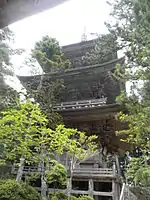 | 34°00′29″N 134°34′56″E | ||
| Chikurin-in Thirteen-Storey Tō 竹林院十三層塔 Chikurin-in jūsan-sō-tō | Tokushima | 34°00′29″N 134°34′56″E | ||||
| Jōroku-ji Shoin 丈六寺書院附棟札一枚 Jōrokuji shoin tsuketari munafuda ichimai | Tokushima | 34°00′19″N 134°33′03″E | ||||
| Jōroku-ji Tokuunin 丈六寺徳雲院附棟札一枚 Jōrokuji Tokuunin tsuketari munafuda ichimai | Tokushima | 34°00′19″N 134°33′03″E | ||||
| Kumadani-ji Niomon 熊谷寺仁王門 (山門) Kumadaniji Niōmon (Sanmon) | Awa | 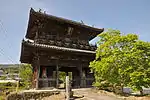 | 34°07′15″N 134°20′24″E | |||
| Okumura Family Residence 奥村家住宅 Okumura-ke jūtaku | 1866 | Aizumi | designation with thirteen components | 34°06′56″N 134°28′57″E | ||
| Kawahito Family Nagayamon 川人家長屋門 Kawahito-ke nagayamon | 1772-81 | Miyoshi | 34°02′37″N 133°47′50″E | |||
| Asa Family Residence 阿佐家住宅一棟及び屋敷林、庭園、石垣、石段、前庭を含む屋敷構え附棟札一枚 Asa-ke jūtaku ittō oyobi yashiki rin, teien, ishigaki, ishidan, zentei o fukumu yashiki kamae tsuketari munafuda ichi-mai | Miyoshi | designation includes forest, gardens, stone walls, stone steps, vestibule | 33°50′41″N 133°54′06″E | |||
| Kumadani-ji Daishidō 熊谷寺大師堂 Kumadaniji Daishidō | Awa | 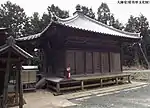 | 34°07′15″N 134°20′24″E | |||
| Kumadani-ji Tahōtō 熊谷寺多宝塔 Kumadaniji Tahōtō | Awa | 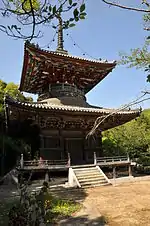 | 34°07′15″N 134°20′24″E | |||
| Kumadani-ji Chūmon 熊谷寺中門 Kumadaniji Chūmon | Awa | 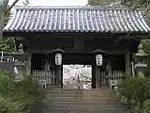 | 34°07′15″N 134°20′24″E | |||
| Kumadani-ji Shōrō 熊谷寺鐘楼 Kumadaniji Shōrō | Awa | 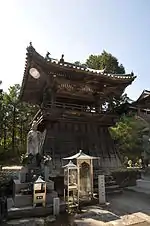 | 34°07′15″N 134°20′24″E | |||
| Miniature Shrine inside Kumadani-ji Daishidō 熊谷寺大師堂内厨子 Kumadaniji Daishidō nai zushi | Awa | 34°07′15″N 134°20′24″E | ||||
| Hashikura-ji Kannondō 箸蔵寺観音堂 Hashikuraji Kannondō | Miyoshi |  | 34°02′57″N 133°50′30″E | |||
| Tokuzen Family Residence 徳善家住宅 Tokuzen-ke jūtaku | 1866 | Miyoshi | 33°52′41″N 133°46′14″E | |||
Municipal Cultural Properties
As of 1 May 2014, forty-two properties have been designated at a municipal level.[6]
| Property | Date | Municipality | Comments | Image | Coordinates | Ref. |
|---|---|---|---|---|---|---|
| Hachiman Jinja Zuishinmon 八幡神社随臣門 Hachiman Jinja zuishinmon | Tokushima | 34°03′57″N 134°32′39″E | ||||
| Mishima Jinja Komainu 三島神社の狛犬 Mishima Jinja komainu | Tokushima | 34°04′29″N 134°32′31″E | ||||
| Kannon-ji Hondō 観音寺本堂 Kannonji hondō | Tokushima | 34°03′41″N 134°32′43″E | ||||
Registered Cultural Properties
As of 1 January 2015, one hundred and thirteen properties at forty-one sites have been registered (as opposed to designated) at a national level.[4][7]
| Property | Date | Municipality | Comments | Image | Coordinates | Ref. |
|---|---|---|---|---|---|---|
| Takahara Building 高原ビル Takahara biru | 1932 | Tokushima | 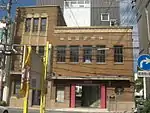 | 34°04′13″N 134°32′56″E | ||
| Seigyoku Sake Company 勢玉 酒蔵A 酒蔵B 煙突 事務所棟 Seigyoku | late Meiji to early Shōwa period | Tokushima | four registrations: storehouses A and B (1902), chimney (1909), and office (early Shōwa period) |  | 34°04′19″N 134°33′48″E | |
| Matsusaka Tunnel 松坂隧道 Matsusaka suidō | 1921 | Mugi | length of 87 metres (285 ft), width of 5.8 metres (19 ft) | 33°39′33″N 134°23′53″E | ||
| Taisan-ji 大山寺 Taisanji | mid to late Edo period | Kamiita | four registrations: hondō (mid-Edo period, relocated in 1796 and repaired in 1952 and 1985), Daishidō (1863, repaired 1985), corridor (late Edo period), and shōrōmon (late Edo period, repaired 1985) | 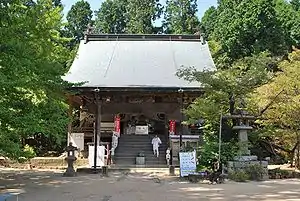 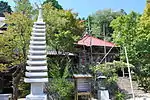 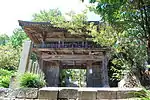 | 34°09′33″N 134°23′59″E | |
| Hashikura-ji 箸蔵寺 Hashikuraji | early Meiji period | Miyoshi | four registrations: high tōrō (1884), chōzuya (1896), Niōmon (1880), and chūmon (early Meiji period) | 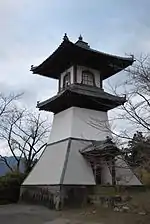 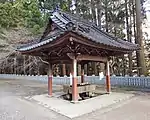 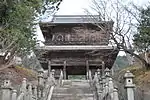 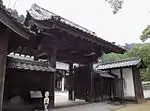 | 34°02′57″N 133°50′30″E | |
See also
References
- "Pamphlet on Cultural Properties". Agency for Cultural Affairs. Archived from the original on 26 October 2014. Retrieved 29 January 2015.
- 国宝・重要文化財 [Number of National Treasures and Important Cultural Properties by Prefecture] (in Japanese). Agency for Cultural Affairs. 1 January 2015. Archived from the original on 30 June 2011. Retrieved 29 January 2015.
- "Database of National Cultural Properties: 国宝・重要文化財(建造物) (徳島県)" (in Japanese). Agency for Cultural Affairs. Archived from the original on 4 December 2015. Retrieved 29 January 2015.
- 徳島の文化財一覧 [List of the Cultural Properties of Tokushima Prefecture] (in Japanese). Tokushima Prefecture. 19 December 2014. Retrieved 29 January 2015.
- 都道府県別指定等文化財件数(都道府県分) [Number of Prefectural Cultural Properties by Prefecture] (in Japanese). Agency for Cultural Affairs. 1 May 2014. Archived from the original on 21 September 2013. Retrieved 29 January 2015.
- 都道府県別指定等文化財件数(市町村分) [Number of Municipal Cultural Properties by Prefecture] (in Japanese). Agency for Cultural Affairs. 1 May 2014. Archived from the original on 14 May 2015. Retrieved 29 January 2015.
- 登録文化財 [Number of Registered Cultural Properties by Prefecture] (in Japanese). Agency for Cultural Affairs. 1 May 2014. Archived from the original on 30 June 2011. Retrieved 29 January 2015.
External links
- (in Japanese) List of Cultural Properties in Tokushima Prefecture
This article is issued from Wikipedia. The text is licensed under Creative Commons - Attribution - Sharealike. Additional terms may apply for the media files.
